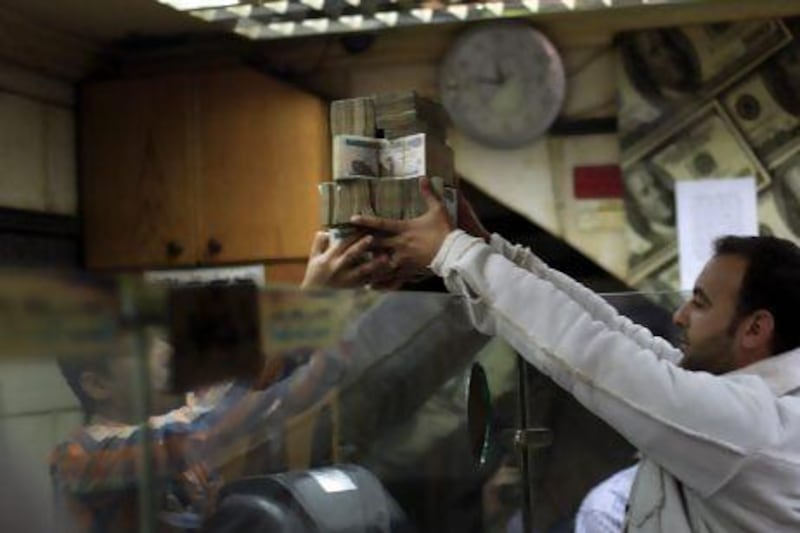Egypt signalled it was ready to resume talks with the IMF over a US$4.8 billion (Dh17.63bn) loan yesterday as its budget deficit widened and foreign investment slumped close to zero.
The planning minister Ashraf El Araby said yesterday the government planned to invite a team from the Washington-based fund within one week.
"Reaching an agreement with the IMF is a positive signal that the Egyptian economy is able to heal," he said during a news conference in Cairo.
"An agreement with [the IMF] is the key engine to get us out of this crisis."
Egypt reached an initial agreement with the IMF on the loan in November but postponed final approval a month later because of political unrest at the time.
It needs the cash to avert an impending liquidity crisis and to patch a gaping budget deficit.
But recently the country's plight has deepened. Last month, Egypt's foreign currency reserves dipped below $14bn, the IMF's recommended level that covers three months of imports.
Underscoring the depth of the crisis, Mr El Araby said foreign investment had all but ground to a halt in the six months to the end of December.
He said Egypt needed strong investment to reach 7 per cent annual economic growth, the rate economists believe is needed to lower unemployment and soak up the waves of young Egyptians entering the labour market.
However, he said growth had been just 2.2 per cent year on year in the three months to the end of December.
Other data presented similarly grim reading. Egypt's budget deficit widened to 92 billion Egyptian pounds (Dh50.17bn) in the first half of the year, compared with 73.3bn pounds a year earlier.
The budget deficit could further swell to 180bn pounds or 10 per cent of GDP in the 12 months to the end of June, he said.
Mr El Araby said the government was confident a deal could be struck with the IMF before parliamentary elections, whose date has yet to be fixed.
His comments indicated the government was in the final stages of the economic programme that it must present as part of the talks.
The challenge for officials under an IMF programme would be to control spending, while not stoking more unrest. The prime minister Hesham Kandil has said any reforms would not target the neediest, amid concern that cutting the subsidies would result in the prices of staple goods soaring.
Although an IMF deal will plug only a small portion of Egypt's budget problems, it is viewed as important to drawing in assistance from other investment sources.
In a sign of the government's eagerness to entice back investment, the government on Wednesday said it would offer arbitration to convicted investors who had fled the country.
As part of a move designed to draw a line under investments associated with the ousted president Hosni Mubarak, the new regime had announced plans for criminal action against a number of foreign individuals and companies in following his departure. In a statement, the government said such a reconciliation would lead to the cancellation of jail sentences and unlock the investors' frozen assets.
* With Bloomberg News, Dow Jones and Reuters





